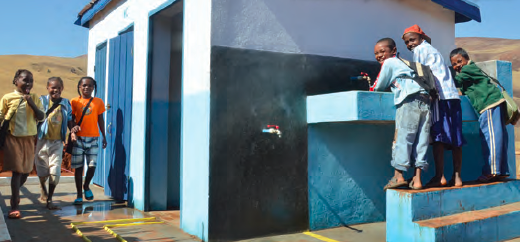The growing interest in Nutrition and WASH: Some new initiatives and developments
 Interest and commitment to nutrition-sensitive interventions and multi-sector coordination has led to an increased number of initiatives and publications on nutrition and water, sanitation and hygiene (WASH).
Interest and commitment to nutrition-sensitive interventions and multi-sector coordination has led to an increased number of initiatives and publications on nutrition and water, sanitation and hygiene (WASH).
Inadequate WASH services and practices are a major concern, with an estimated 663 million people worldwide not accessing improved drinking water, and one third of the world’s population lacking access to an improved sanitation facility.
A recent WHO, UNICEF and USAID publication lists the global-level commitments and policy basis for scaling up joint nutrition and WASH interventions. It includes:
Nutrition and WASH as related human rights are enshrined in Article 24.2(c) of the Convention on the Rights of the Child urging states to ensure “adequate nutritious foods and clean drinking water” to combat disease and malnutrition (UN, 1989).
The 1992 and 2014 International Conferences on Nutrition led country delegates to adopt the Rome Declaration on Nutrition and the Framework for Action, which recommends “actions on water, sanitation and hygiene”.
The Global Nutrition Targets 2025 led the World Health Assembly to call for combined actions in health, food and other sectors, including WASH (WHO, 2012).
The Scaling-Up Nutrition (SUN) Movement partners are working together to implement multi-sector action in order to deliver nutrition-specific and nutrition-sensitive interventions effectively and sustainably.
Source: Improving Nutrition Outcomes with better water, sanitation and hygiene: practical solutions for policies and programmes. (WHO, UNICEF, USAID 2015)
Notable recent publications on nutrition and WASH include:
- Improving Nutrition Outcomes with better water, sanitation and hygiene: practical solutions for policies and programmes. (WHO, UNICEF, USAID 2015)
- Multisectoral Approaches to Improving Nutrition: water, sanitation and hygiene. Chase, C, Ngure, F. (2016). The Water and Sanitation Program.
- The Impact of Poor Sanitation on Nutrition. Policy brief. SHARE Research Consortium, London, UK; UNICEF India, Delhi, India Chitty, A. (2015).
- The Power of WASH – Why Sanitation Matters for Nutrition. Spears, D, Haddad, L. (2015). International Food Policy Research Institute (IFPRI).
A specific Working Group on WASH and Nutrition has been established under the Sustainable Sanitation Alliance (SuSanA). The main aim is to examine the adverse nutritional impacts of lack of safe WASH, particularly in acute and chronic emergency situations. The group is currently looking at the impact that faecally-related infections can have on the nutritional status of children and other vulnerable groups and has recently held online discussions on this important area.
Reference Links:
www.forum.susana.org/forum/categories/92-nutritionand-wash and www.en-net.org/question/2437.aspx.

